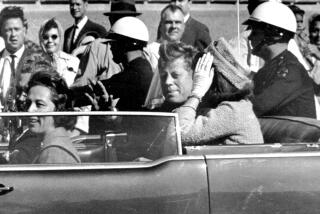George Bernau, 60; Lawyer Who Became Author of ‘What-If’ Novels Based on JFK, Marilyn Monroe
- Share via
George Bernau, a lawyer who turned his “what-if” musings into popular novels, beginning with the 1988 “Promises to Keep,” an imagined post-Dallas life for President Kennedy, has died. He was 60.
Bernau died Dec. 12 in Washington state of complications from a stroke suffered in October, his family said. He had moved to Washington from Santa Barbara in 1998 to be near his daughter, Erin.
The fledgling author made publishing history in 1987 when his derivative JFK manuscript was purchased by Warner Books for $750,000, a record advance for a first novel at that time.
“It really shakes out memories of growing up and having Kennedy die,” Bob Miller, Bernau’s editor at Warner Books told The Times about the manuscript then. “ ... It gives you a deja vu of growing up in the ‘60s .... It’s a collective fantasy to have Kennedy come back to life.”
The story about President John Trelawny Cassidy surviving being shot in a Dallas motorcade -- and getting a second chance to keep the promises he made as a candidate -- stemmed from two of Bernau’s personal experiences.
The first occurred in 1977 when he was severely injured in an automobile accident. As the 6-foot-6, thirtysomething lawyer lay in the emergency room wondering if the doctor who predicted he would die was right, he reevaluated his life. Given a second chance to keep his promises to himself, he abandoned law in 1981 and began to write.
The second key evening came in 1983, after Bernau had completed a novel called “High Wire Act,” which he was too embarrassed to publish. He was in Palm Desert, talking politics with a friend and wondering how their lives and the world might have been different had Kennedy survived the Nov. 22, 1963, fatal shooting.
Bernau closeted himself in his Solano Beach, Calif., home and for five years wrote in longhand in spiral notebooks. By 1988, the 25th anniversary of Kennedy’s death, he had published a 641-page success. The book, which received positive reviews and sold well, was soon optioned for a television miniseries.
Unlike Kennedy, Bernau’s President Cassidy survives three bullets. He opts not to seek reelection but puts his brother on the ticket as vice president to a Lyndon B. Johnson stand-in called Ransome Gardner.
After the brother dies in a helicopter tour of Southeast Asia, the former president challenges Gardner in the 1968 primaries, forcing him to withdraw. Also involved is the revelation of a failed plot to assassinate Fidel Castro and its consequence of putting a second gunman in Dallas.
“This is a story of conspiracy and corruption, of assassination, of regicide. For a generation of Americans, it is the story of their age,” wrote former Democratic Sen. Gary Hart of Colorado in reviewing the book for The Times. “One believes, uncynically that Bernau was compelled to write this book. John Kennedy (with, it must be said, all his faults) was the Last American Hero.”
Bernau’s second book, “Candle in the Wind” published in 1990, dealt with another popular iconic figure, Marilyn Monroe.
That novel explored “what if” she had survived her 1962 drug overdose. Bernau’s movie star Marilyn Lane is spirited to a hospital, disappears, and her doctor and housekeeper are murdered. A Hollywood detective pursues the case to Baja California, shadowed by a hired assassin and both CIA and White House agents.
“Bernau ... does a masterful job here in weaving fact, prevalent myths and artful fiction into a fast-paced thriller that races from Los Angeles to Baja, back to Los Angeles, and then to the East Coast -- Washington and then a narrow wooden bridge over the chill waters of Triondak Bay near the Maryland coast,” wrote Don G. Campbell in reviewing the book for The Times.
“There are plots tumbling on top of subplots, and there is enough skulduggery -- at the international level, the national level, the Hollywood level and at the human-passion level -- for a dozen books,” he added.
“This is an ingenious puzzler with tightly paced transitions of time, place and character that make it almost impossible to put down,” Campbell wrote.
Bernau’s less successful third novel, “Black Phoenix” in 1994, supposes that Adolf Hitler henchman Joseph Goebbels fakes his own death and continues World War II from outside Germany, using a deadly biological weapon.
“Bernau tells his story in a brisk, straightforward fashion. Unfortunately,” wrote reviewer Chris Petrakos for the Chicago Tribune, “the plot isn’t quite developed enough; it needs more expansion and adornment. Even with a neat twist at the end, this one never quite gets up to speed.”
Bernau also wrote occasional book reviews for The Times.
Born Feb. 14, 1945, in Minneapolis, Bernau earned a bachelor’s degree in business administration from USC. After working in the Universal Studios marketing department, he returned to USC for a law degree and practiced with the San Diego firm of Luce, Forward, Hamilton & Scripps.
His wife, Laurel, died of breast cancer in 1998. Bernau is survived by their daughter.
Memorial donations may be sent to the Susan G. Komen Breast Cancer Foundation.
More to Read
Sign up for our Book Club newsletter
Get the latest news, events and more from the Los Angeles Times Book Club, and help us get L.A. reading and talking.
You may occasionally receive promotional content from the Los Angeles Times.









